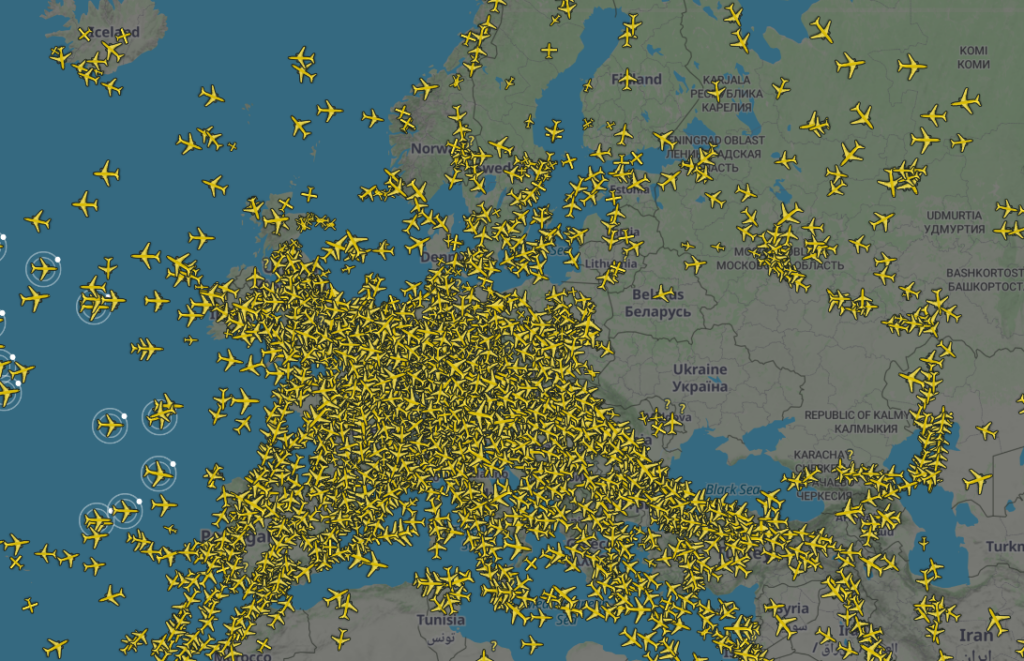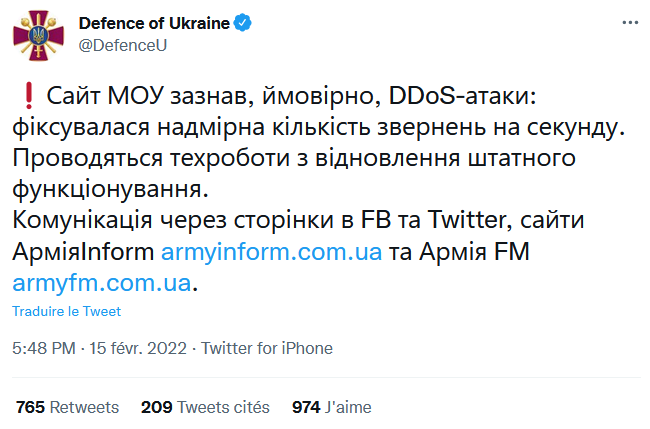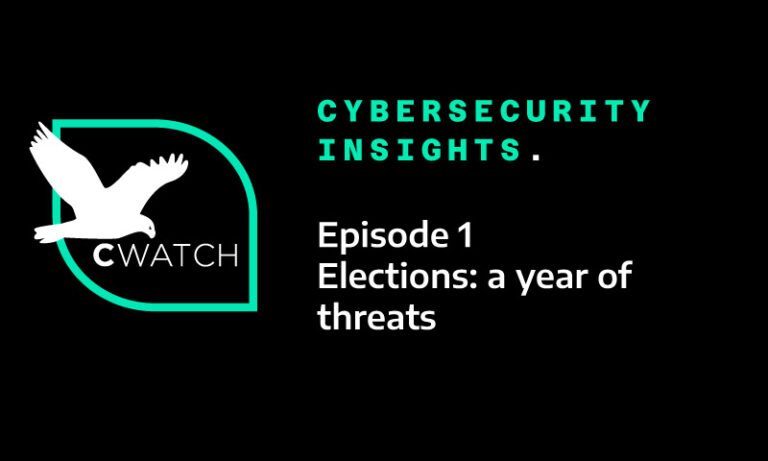25/05/2022
Cybersecurity Insights
Tensions géopolitiques et conflit entre la Russie et l’Ukraine | Mesures de prévention
L’invasion militaire de l’Ukraine par la Russie, accompagnée de cyberattaques, cible des infrastructures critiques du pays. Ces dernières semaines, le nombre d’évènements et d’incidents cyber signalés contre des institutions, des organisations et la population ukrainienne s’est considérablement accru. Au-delà des risques pour les infrastructures essentielles et les biens civils, les actions sèment la méfiance, participent à limiter l’accès à des informations exactes, ou encore diffusent de fausses nouvelles.

Invasion du cyberespace Ukrainien par la Russie
Depuis mai 2014, la Russie mène des opérations cyber pour atteindre et affaiblir l’Ukraine. La première occurrence recensée est la perturbation et manipulation des élections présidentielles ukrainiennes de 2014. Cette attaque a eu pour objectif d’altérer et truquer les voix afin de tenter de faire élire le candidat d’extrême droite.
Entre 2015 et 2018, des attaques visant à perturber le secteur de l’énergie, le secteur financier et les institutions régaliennes de l’Ukraine ont été menées par des acteurs malveillants présumés soutenus par le gouvernement russe ou par le gouvernement russe lui-même. On dénombre : Power Grid Attack, NotPetya, VPNFilter.
Enfin, depuis le 14 janvier 2022, une série d’attaques menées par la Russie à l’encontre de l’Ukraine a été recensée, incluant : le défacement du site internet du gouvernement Ukrainien, des attaques DDoS sur des institutions politiques, financières et militaires, une campagne de désinformation (SMS) visant les civils et la destruction (HermeticWiper) d’un certain nombre de données détenues par des organisations financières et des entités du gouvernement ukrainien, letton et lituanien. (1, 2, 3, 4)

A l’instar du climat menaçant illustré par l’image ci-contre, perceptible au-delà des frontières de l’Ukraine, certains secteurs, logistiques notamment ont d’ores-et-déjà pris des mesures drastiques pour limiter le contact avec le territoire ukrainien. Une bulle analogue peut et doit être considérée en matière de cyber sécurité.
Ces attaques cyber frappent le territoire ukrainien tout entier en même temps que les frappes militaires, il est probable que ces opérations se poursuivent et s’intensifient ces prochains jours ou semaines.
A titre d’exemple, le CERT du gouvernement ukrainien a déclaré ce-jour qu’une campagne massive d’hameçonnage cible actuellement les adresses e-mails privées de militaires ukrainiens et personnes apparentées, dans le but de dérober les e-mails et siphonner le carnet d’adresses de la victime. Cette attaque, sans lieu de causalité officiellement établi avec l’invasion russe, a été effectuée par le groupe UNC1151 basé en Biélorussie.

Impact du conflit sur l'écosystème cyber français et européen
Les régulateurs européens (5, 6) ont invité les organisations des secteurs publics et privés de l’UE à améliorer leur résilience globale aux attaques. Le CERT-FR et l’ANSSI demandent aux organisations françaises d’augmenter leur vigilance cyber (7). Les autorités avertissent que les industries suivantes seraient plus susceptibles d’être visées par une attaque russe dans un avenir proche : le secteur bancaire, l’industrie de la défense, les services de communication et le secteur de l’énergie.
On a pu noter également, en marge des préparatifs du conflit fin janvier, des évènements dans le secteur logistique (attaques sur des infrastructures portuaires).
Aujourd’hui, nous pensons que l’impact du conflit sur les organisations issues des pays autres que Chine, Russie, Biélorussie, Venezuela, Corée du Nord et Syrie, pourrait être l’effet d’attaques indirectes menées sur l’Europe de l’Est ou des pays alliés avec lesquels des entités françaises pourraient avoir une adhérence technique, physique ou humaine (i.e. transit énergétique nord européen, terminaux portuaires majeurs). En guise de rappel, NotPetya, originalement conçu et déployé pour cibler l’Ukraine, avait infecté et paralysé un nombre important d’entreprises dans d’autres pays (France, Allemagne, Italie, USA, Royaume-Uni, …).
La Russie peut ou pourrait soutenir des acteurs malveillants opportunistes afin d’affaiblir toutes entités présentes au sein des pays de l’OTAN. Ces acteurs malveillants pourraient profiter de l’invasion de l’Ukraine par la Russie, pour distribuer des logiciels malveillants (par exemple depuis des entreprises Ukrainiennes). Ainsi, il faut se préparer à une intensification des campagnes malveillantes sur des entités « occidentales ».
Certains éditeurs observent par ailleurs une recrudescence des attaques contre les secteurs de l’énergie, de l’aviation et des médias en Europe depuis début février par des acteurs présumés géolocalisés en Russie (RansomExx, LockBit, Hive, BlackCat, BlackByte et Conti).

Nos recommandations
Nous vous recommandons d’élever votre niveau de vigilance vis-à-vis de la sécurité de votre SI en cette période et d’assurer une surveillance continue (SOC). Si vous disposez d’ancrages (filiales, partenaires stratégiques, …) en Ukraine ou dans les pays de l’Europe de l’Est membres de l’OTAN, nous vous recommandons fortement d’évaluer les risques associés au contexte géopolitique et prendre toute mesure drastique nécessaire pour protéger votre SI.
Nous attirons plus particulièrement votre attention sur les mesures de prévention suivantes :
- Veiller à ce que les composants de sécurité (EDR, EPP, IPS, proxy, pare-feu, anti-spam…) soient opérationnels et à mettre à jour vos bases de signature et d’indicateurs de compromission.
- Veiller à la bonne application des correctifs de sécurité sur les systèmes utilisés, en priorité sur les actifs exposés sur internet, mettre en place des mesures de confinement pour les systèmes non patchés.
- Vérifier que les connexions externes (VPN, Citrix, UAG…) sont limitées au strict nécessaire et/ou durcir les accès, par exemple via une authentification multi-facteurs. Le bannissement des ranges IP des pays suivants est également une option à considérer : Russie, Biélorussie, Venezuela, Corée du Nord et Syrie, voire Chine le cas échéant.
- Isoler les copies d’or des sauvegardes de vos équipements critiques et veiller au bon fonctionnement de la stratégie de sauvegarde et de restauration.
Enfin, nous vous conseillons de préparer un plan de continuité et de reprise d’activité afin de disposer des outils et méthodologies pour faire face à une menace de type rançongiciel ou « wiper » (malwares effaçant les données). Le bon fonctionnement de la stratégie de sauvegarde et restauration des données est essentiel.

Références
2 – https://blog.talosintelligence.com/2022/01/ukraine-campaign-delivers-defacement.html#disinfo
3 – https://www.sentinelone.com/labs/hermetic-wiper-ukraine-under-attack/
4 – https://twitter.com/DefenceU/status/1493628291844083723
6 – https://www.enisa.europa.eu/publications/boosting-your-organisations-cyber-resilience
7 – https://www.ssi.gouv.fr/actualite/tensions-internationales-renforcement-de-la-vigilance-cyber/
Autre – https://www.cisa.gov/uscert/ncas/alerts/aa22-054a
Autre – https://ncsc.gov.uk/files/Cyclops-Blink-Malware-Analysis-Report.pdf










